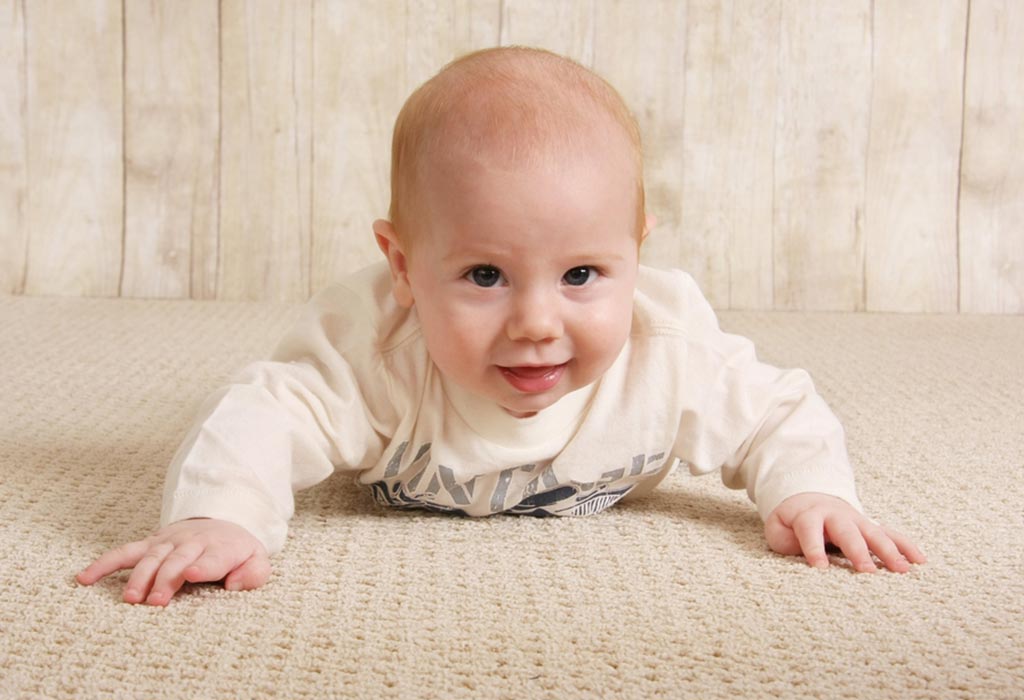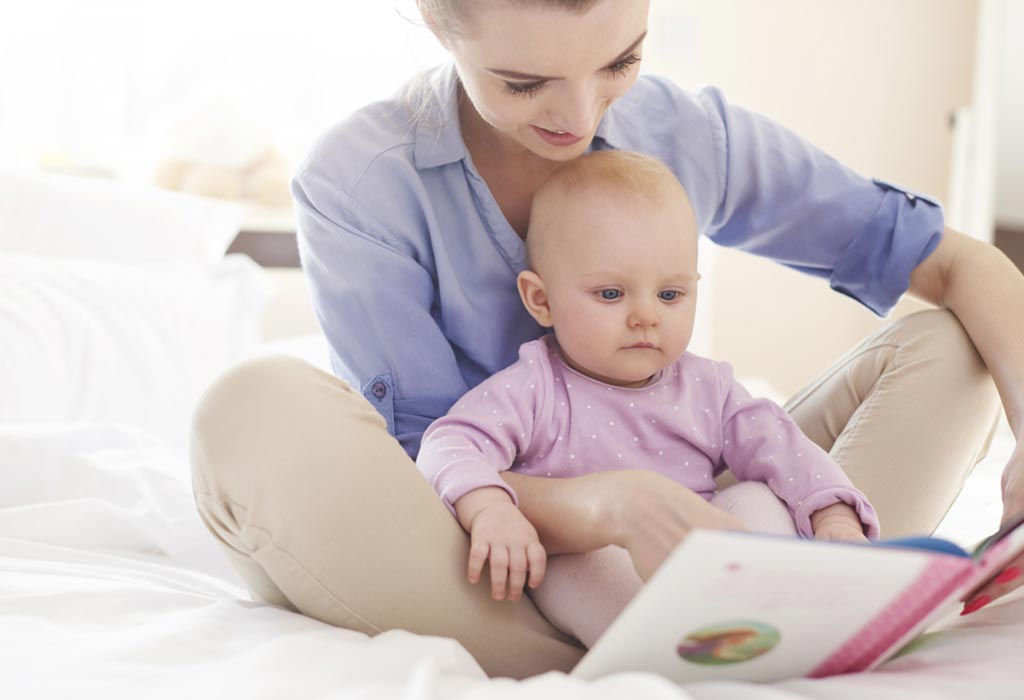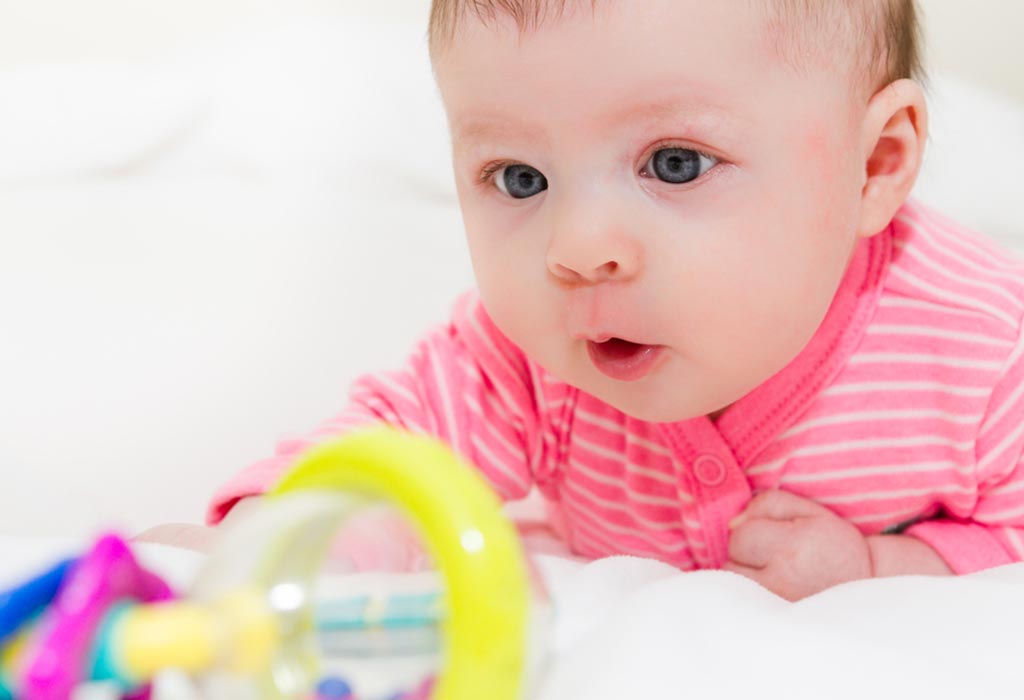In this Article
At five months of age, your baby is developing his key senses rapidly. His energy levels will be higher, his muscle movements and dexterity will be better, and his visual perception and hand-eye coordination will improve. Additionally, he will also be able to express his emotions with the help of facial expressions when speaking.
At this stage of development, your baby will demand attention and would want to play more often. Besides preventing boredom, playing is very important to develop his motor skills. In this article, we will discuss the various 5-month-old baby development activities that can be initiated to ensure that your baby’s full potential is realised.
Major Developmental Milestones for a 5-month-old Baby
There are various milestones of development that a baby has accomplished by the time he is five-months-old. Some key developments in a five-month-old baby include:
1. Visual Perception
Your baby now has improved visual perception. He can observe and track movements, respond to familiar faces, make eye contact, and recognize objects such as his favourite toy. He also has improved control over his eyes which is known as visual tracking. This skill is necessary later in life as it helps in developing reading and writing skills.
2. Sound Perception
Sound perception improves considerably at five months of age. By this age, a baby can now pinpoint the source of a sound as well as recognize familiar voices. Don’t be surprised if you find him darting his eyes across the room when he hears you sing your favourite song!

3. Muscle Movement and Flexibility
Your baby will now be able to roll on his own and make attempts at crawling. He will also be able to hold, lift, and move objects (light ones of course)! One of his greatest achievements during this time will be his ability to sit up momentarily without any help.
4. Cognitive Skills
Your little one will now also be able to identify familiar objects such as a toy. He will even be able to comprehend the purpose of building blocks and play with them like an expert!
5. Facial Expressions
Your baby will now display facial expressions and make attempts to speak even though he is only learning to make sounds. Don’t be surprised if you hear some incoherent babbling during this time.
15 Activities for Five-Month-Old Babies
Given below is a compilation of activities that will keep a 5-month-old baby engaged for long:
1. Floor Play
It is important for a baby to try and move around on his own. This moving around will help in building his muscle strength in the arms, neck, back, and shoulders. These very muscles will enhance his ability required to roll, crawl, sit upright, and walk in the coming months. This is one of the important 5-month-old baby play activities.
What is Required – A blanket or carpet and toys.
How to Do it – Lay a soft blanket or carpet on the floor and place your baby on it. He can be placed either on his back or his tummy. Now spread an assortment of toys around the baby and encourage him to reach out and play with those toys.
Which Skills are Developed – Muscle strength and flexibility.

2. Follow the Object
This is one of the most important 5-month-old baby play activities, as it helps improve eye movement. This simple activity which encourages a child to focus on an object and track its motion will enhance his visual tracking skills.
What is Required – Objects and toys that make a sound or have lights such as rattles, bells, etc.
How to Do it – Lay your baby on his back. Hold a toy or an object that makes sound and can hold your baby’s attention. Now move the object from side to side ensuring that the movement is slow enough for your baby eyes to follow. You could move the object up and down to get the full spectrum of visual tracking. Ensure that the object is at an approximate distance of one foot. If your baby is distracted, bring the object back to the centre to grab his attention again.
Which Skills are Developed – Visual perception, sound perception, and visual tracking.
3. Baby’s Day Out
It may seem of no importance, but just carrying your baby and going out for a stroll is in itself an activity that is good for a baby’s sensory development.
What is Required – A baby sling, pram, or similar equipment to carry a baby.
How to Do it – Place the baby in a baby sling or pram; you could even simply carry your baby in arms and head out for a stroll. Choose places to walk that are not noisy and crowded. A park or a garden are some good places where you can try this. Allow your baby to explore…let him touch the plants, flowers, and feel the grass or soil. However, keep a watch as he still does not have much control and could hurt himself.
Which Skills are Developed – Overall sensory perception.
4. The Sound of Music
Music can be very soothing for babies; they enjoy soft and melodious music, so play some music and have fun.
What is Required – Calm atmosphere, a music system.
How to Do it – Hold your baby by putting your hands under his arms, switch on the music and observe if he reacts. If your baby tries to move, help him to do so in rhythm with the music. Do note to avoid playing loud music and stick to playing only soft melodious music. Note that music should be played at intervals; if the music is played all day long, he will soon start ignoring it.
Which Skills are Developed – Sound perception, social play, and motor skills.
5. Up and Above
Up and above in the air can be a really fun activity for kids as they feel a sense of freedom when they are in the air.
What is Required – Some free playtime and attention.
How to Do it – Hold the baby from under his arms and lift him up in the air. Now gently move him up and down, side to side and go around while holding him in the air. Take a break every 5 minutes. These movements help develop the vestibular system which helps a baby understand his body in relation to the things around him.
Which Skills are Developed – Social play and vestibular system.
6. Treasure Chest
Babies need to interact with toys and objects. The basic skills such as holding, pulling, pushing, releasing, moving from one hand to the other and throwing have to be learned. This activity will strengthen his muscles.
What is Required – A cardboard box or carton, toys, and a few random objects.
How to Do it – Fill the cardboard box with toys and random objects. Now, bring the baby close to the box and encourage him to explore the contents of the box. Let the baby’s curiosity get the better of him, encourage him to pick, hold and play with various objects. You can even name the objects and tell him what they are when he picks them out of the box. However, be cautious and do not place sharp pointy objects near him. Avoid using small objects as your baby can swallow them.
Which Skills are Developed – Motor skills and reasoning skills.
7. Now You See Me, Now You Don’t
Curiosity may have killed the cat, but it is a basic human trait. Our ability to reason and ask questions is what sets us apart from other mammals. This inquisitive nature of ours is a necessary trait that should be encouraged; this activity will do just that.
What is Required – A bed sheet and the baby’s favourite toy.
How to Do it – Place the baby on the bed, now get his favourite toy, and place it partially hidden under a blanket. Draw your baby’s attention to the toy and encourage him to reach for it. When he does, pull the toy completely below the blanket. Your baby will be surprised and wonder where it went. Bring it out of the blanket in another place and pull it inside when the baby reaches for it.
What Skills Developed – Curiosity and motor skills.
8. Story Fun
Storytelling would be a frequent activity in the months to come. But at five months this activity can and should be initiated particularly as a bedtime activity.
What is Required – An illustrated storybook with bright and lively images.
How to Do it – Make your baby sit on your lap, open a children’s book and start reading from it. Point at the illustrations and teach the baby to focus on the book. If he wants to touch the book or flip a page, let him do it. This activity will in time get him familiar with some basic words, and he will develop the ability to listen.
Which Skills are Developed – Language skills, visual skills, and cognitive skills.

9. Puppeteer
A baby needs to learn interaction. This will help him to communicate freely with people around him in his later years. This next activity, being interactive in nature will achieve just that.
What is Required – A hand puppet.
How to Do it – Place a puppet on your hand and bring it close to the baby while speaking in the voice of a cartoon. Allow the baby to reach out to touch the puppet and respond accordingly.
Which Skills are Developed – Imagination, creativity, humour and motor skills.
10. Bubbles
A quick and easy way to grab your baby’s attention and stimulate his curiosity.
What is Required – Something to blow soap bubbles.
How to Do it – Start blowing bubbles in your baby’s direction and let him observe. If he feels excited, feel free to increase the rate of blowing bubbles.
Which Skills are Developed – Visual perception and curiosity.
11. Fruits and Vegetable Intro
The sense of smell is very important for us. This wonderful little activity can help your little one appreciate some healthy food options.
What is Required – A variety of fruits and vegetables.
How to Do it – Cut different fruits and vegetables and bring them about 4 inches near your baby’s nose. Encourage him to smell the food and mention the name of the fruit or vegetable the moment you notice him responding to its smell. Ideally, use the fruits and vegetables with pleasant fragrances like cucumber, banana, pumpkin, and mango.
Which Skills are Developed – Olfactory and recognition of food by scent.
12. Bounce
A bouncy ball is a great way to stimulate a baby’s natural curiosity.
What is Required – A soft, bouncy ball.
How to Do it – Sit your baby upright with his back against the wall. Now, start bouncing the ball to catch the baby’s attention and when he is looking, gently roll the ball towards him. Let him reach for the ball and move it around.
Which Skills are Developed – Motor skills and curiosity.
13. Cradle Soccer
It is important for a baby to learn to focus on an object as it can help in concentration in his later years. Most playing and even learning activities in the coming years will require his undivided attention and this game can help him do just that.
What is Required – A soft toy and string.
How to Do it – Place your baby on the floor, close to a chair or stool and hang a soft toy from the chair. Do it in such a way that the baby can reach it with his feet. Now prompt him to kick and make a happy sound every time he kicks it.
Which Skills are Developed – Motor skills and play skills.
14. Follow the Toy
This activity will improve his visual tracking skills and muscle coordination.
What is Required – A soft toy and string.
How to Do it – Sit on the floor with your baby upright on your lap. Now, tie a soft toy to a string and drag it on the floor in front of him from side to side. Let him track the toy with his eyes and head. Feel free to increase the speed if required. If he reaches out to grab it, let him and then repeat.
Which Skills are Developed – Visual tracking.

15. Sound Source
It is not only important for the baby to learn how to track an object by sight but also by sound. This exercise will improve both the audio and visual perception of a baby.
What is Required – A rattle and hand towel.
How to Do it – Place the baby on the bed and bring a rattle close to him. Make it rattle and once your baby is looking at it, hide the same behind the hand towel. Continue to make the sound keeping it behind the hand towel while moving both of them around. This will help your baby increase his sense of hearing as well as track the source of the sound.
Which Skills are Developed – Audio-visual perception and cognitive ability.
16. Baby Sit-Ups
Any activity that involves movement for babies exercises their muscles. This one is not just an exercise but also a way to bond with them.
What is Required – A comfortable place for you to stretch your legs and lie down.
How to Do it – Sit with your legs stretched on a floor or a bed and make your baby sit on your lap. Bend your knees to create back support for the baby. Hold him under his arms and slowly stretch your legs as you lay the baby on the lap. Keep talking to him all the while or sing the nursery rhyme “Jack and Jill” as you bring the baby up or gently take him down.
Which Skills are Developed – Neck and head muscles, and bonding skills.
17. Bathing Time
Bathing time is not just required to maintain cleanliness. It can also be used to bond with babies and develop certain skills.
What is Required – A baby bathtub, bath toys that make squeaky noises.
How to Do it – When you put the baby in the bathtub, introduce toys like a rubber duck, his rattler, etc. Then, as you bath him, make soft noises to can grab his attention, let him hold the toys and play with them also. At times, gently sprinkle some water on his face to continue playing with him and then move back to the toys. You may also tell him cute little stories as you bathe him.
Which Skills are Developed – Association between object and sound, sense of touch, visual perception, improves his grip.
Tips for Parents of a 5-month-old Infant
At five months of age, a baby enters the phase where his learning curve is speeding up. From this point on, your baby will be learning fast and his skills will be developing at a rapid pace. Here are some tips to keep pace with your baby’s growth.
- At five months of age, your baby will have become very energetic. He will be moving faster and with increased frequency. It is advisable to remove all toys hanging over his crib or elsewhere within his reach as they are now hazardous.
- The time has come for your baby to crawl around the house and explore things for himself. Lock all cupboards and cabinets that are within his reach. All sharp corners of the house should be cushioned and taped.
- At this stage, babies are particularly prone to choking hazards as they try to examine and understand things with their mouth. Keep all small objects that can be swallowed by them out of their reach.
- Never force your baby to do things he does not wish to do.
- Babies differ from one another and can also display a unique personality. If your baby is slow in learning a form of play or other activity, it is not a cause of concern.
- Learning to speak is an important milestone. Babies learn by imitation, so talk to your baby as frequently as you can even if he does not understand what you say.
- Babies love to be touched, kissed, and caressed particularly by the mother. This display of affection is important for them to be calm and composed.
The joy of spending time and playing with a baby cannot be expressed in words. It is, however, prudent to understand that play is not only about having fun and passing the time, it is also an important component of a baby’s growth and development. Activities that improve a baby’s essential skills should be pursued.









